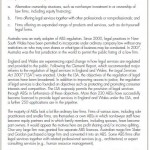The Future of Law: Should legal service providers be regulated?

By stating that they are not practising law or providing legal advice, legal service providers (see yesterday’s post on what a “legal service provider” is) shrewdly aim to take themselves out of the current legal services regulatory scheme and nicely avoid all the education, admission, ethics and insurance obligations that lawyers must fulfill.
You can better understand the impact of this if you go back to the “before” and “after” scenarios outlined in the the first excerpt of this article. Your parents had some guarantee as to the quality of the legal services they got, and some recourse if there was a problem. If the legal services your child gets come from a legal service provider that is outside the regulatory framework, it is quite possible they will have no guarantees as to the quality of the legal services they will get and little or no recourse if there is a problem. For the sake of consumer protection, this suggests that all legal service providers should be regulated.
For this reason, ultimately regulators may look to regulate all legal services providers – not just lawyers. This “entity regulation” has started to happen in some jurisdictions. The alternative business structures (“ABS”) approach in the United Kingdom is one example of this. Click the sidebar below for more details on what ABSs are.
When considering the regulation of legal service providers, two other related questions come up. First, should legal service providers be on the hook if they make a mistake? As a matter of consumer protection, the obvious answer to this question is “yes.” There can be very significant legal, financial and/or personal consequences if there is a problem with the legal services provided to a client.
Buying legal services is different from buying running shoes on Amazon or trinkets on eBay. The terms of service on almost all online legal service provider sites have very broad waivers of liability. At best there is a money-back guarantee. This would not properly compensate a client that has been seriously harmed by erroneous legal services (e.g., a will purchased for $30).
Jurisdiction matters
In most every jurisdiction, including Canada, legal services regulation is very much based on jurisdiction – you must comply with the regulatory regime in the jurisdiction where you are providing legal services. In Canada we have mobility rules which allow lawyers to practice across the country. A similar regime is in place in Europe, but this is not typical of most jurisdictions in the rest of the world. Mobility is difficult if not impossible in most other jurisdictions, including the United States, although there are signs that this is starting to change in some places. For example, discussions are ongoing about legal services falling under GATT, the General Agreement on Trade and Tariffs.
However, the current regulatory model doesn’t work well in the world of your child’s lawyer. This is because your child’s lawyer could easily be a non-lawyer or computer, and may be outside of Ontario. Practically speaking, this puts such legal service providers beyond the reach of any Ontario regulation, education, ethics rules and insurance requirements.
And it gets even more complicated when you deal with matters involving multiple jurisdictions. Which jurisdiction is relevant if an Ontario resident purchases a lease document for a Florida condo from an online forms site owned by an Irish company (not a law firm) with servers in Germany?
Dealing with the complications that the “different jurisdictions” issue raises will have to be sorted out by legal service regulators. Presumably they will look to a jurisdiction where the matter has some physical or virtual nexus. And we may ultimately need some kind of international regulator or enforcer – like an Interpol for legal services providers.
This article is from the September 2013 issue of LAWPRO Magazine, which can be read in full here.


Leave a Reply